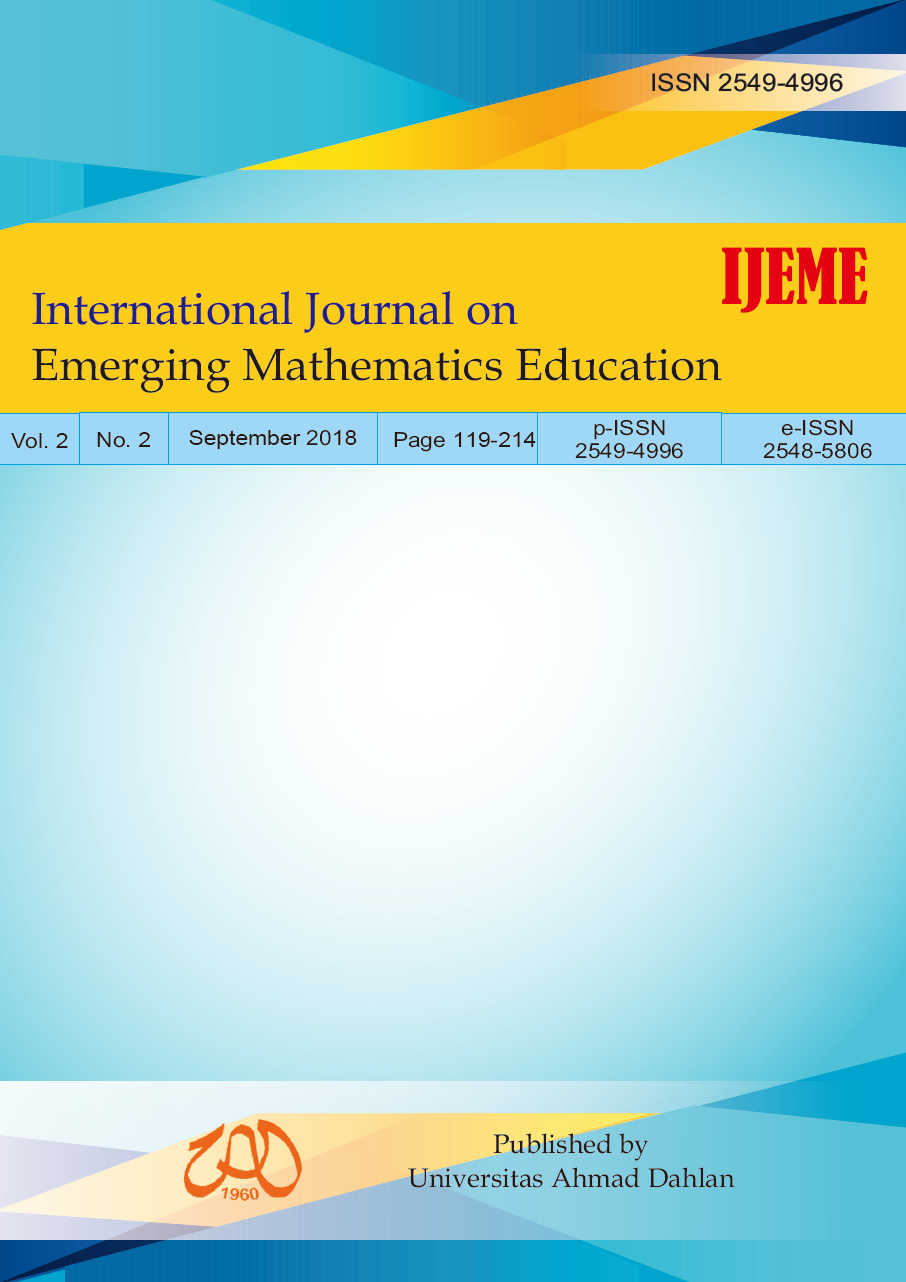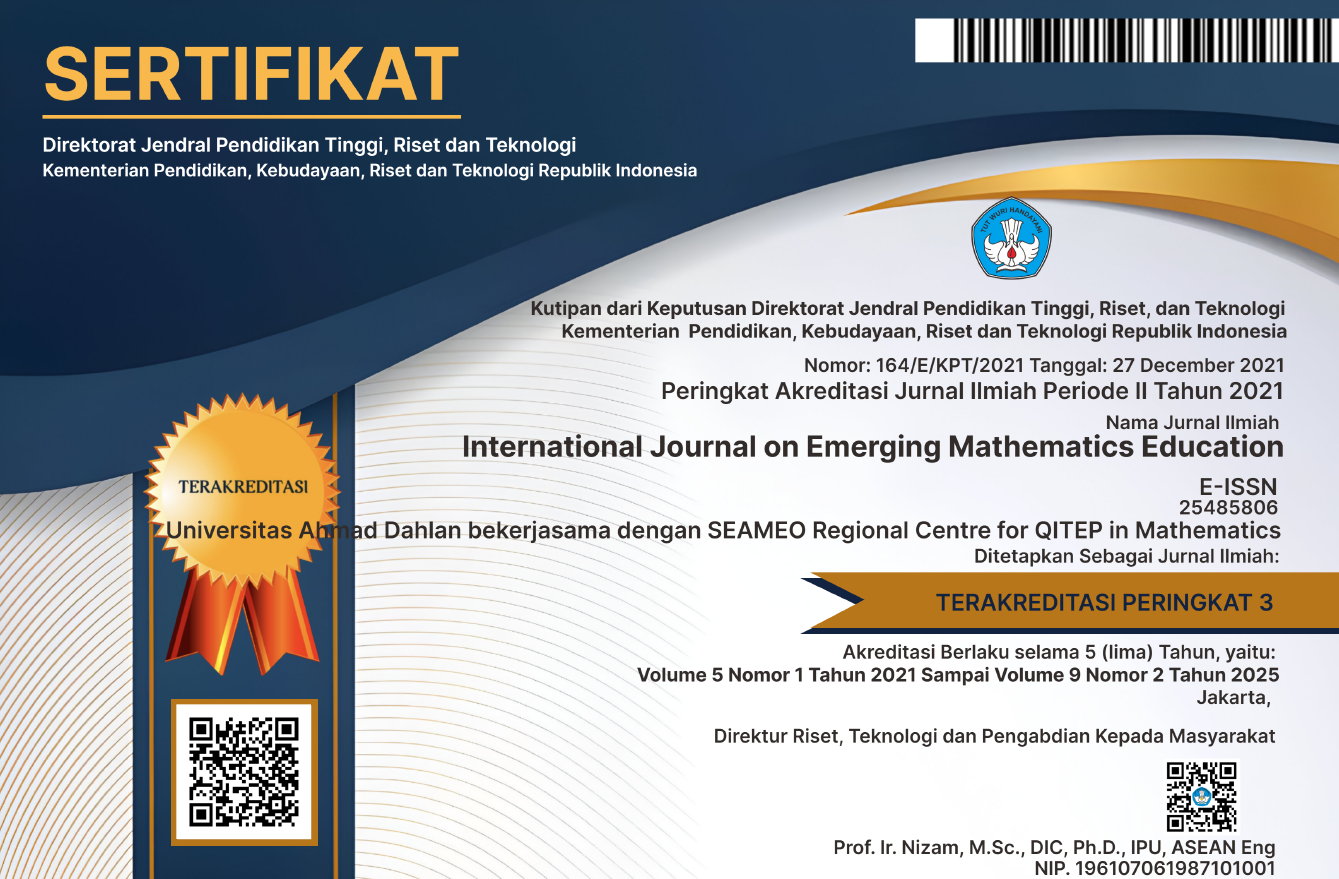Students’ Mathematical Communication Ability and Self-Efficacy using Team Quiz Learning Model
DOI:
https://doi.org/10.12928/ijeme.v2i2.8702Keywords:
mathematical communication, self-efficacy, team quiz learning modelAbstract
This research aims to examine the improvement of mathematical communication skills of the students who learn using the team quiz learning model. This is an experimental research with pretest-posttest-control group design. The population of this study is all of the seventh-grade students in one of the junior high schools in Banda Aceh. We use a simple random sampling technique to obtain two classes as the research samples. The data were collected using tests of mathematical communication skills and self-efficacy questionnaires. The statistical tests used in this study were the paired t-test and two-way ANOVA. The results show that: (1) The improvement of the students’ mathematical communication ability in the team quiz class is higher than the conventional class; (2) The improvement of the students’ self-efficacy in team quiz class is higher than the conventional class; (3) There is no interaction between the learning model and the student level towards the students' mathematical communication ability; and (4) There is no interaction between the learning model and the student level towards the students’ self-efficacy.References
Ansari, B. I. (2016). Komunikasi Matematika, Strategi Berpikir dan Manajemen Belajar: Konsep dan Aplikasi. Banda Aceh: PeNA.
Bandura, A. (1989). Human agency in social cognitive theory. American Psychologist, 44(9), 1175-1184.
Bandura, A. (2015). On deconstructing commentaries regarding alternative theories of self-regulation. Journal of Management, 41(4), 1025-1044.
Creswell, J. W. (Ed.). (2013). Research Design: Qualitative, Quantitative, and Mixing Methods Approaches, Third Edition. California: SAGE Publications.
Handayani, A., Mukhni, & Nilaswati, Z. A. (2012). Analisis Kemampuan Komunikasi Matematis Siswa Melalui Pendekatan Pendidikan Matematika Realistik (PMR) Bagi Siswa Kelas VII MTs N Lubuk Buaya Padang Tahun Pelajaran 2013/2014. Jurnal Pendidikan Matematika, 1(1), 1-6.
Hirschfeld-Cotton, K. (2008). Mathematical communication, conceptual understanding, and students' attitudes toward mathematics. Action Research Project, 4, 1-51.
Junita, E. (2014). Penerapan Model Pembelajaran Team Quiz pada Materi Statistika di Kelas VII SMP Negeri 7 Banda Aceh. Final project. Banda Aceh: Universitas Syiah Kuala.
Kaba, Y., & Şengül, S. (2016). Developing the Rubric for Evaluating Problem Posing (REPP). International Online Journal of Educational Sciences, 8(1), 8-25.
Karlimah, K., & Lestari, D. F. (2014). Meningkatkan Kemampuan Komunikasi Matematis Siswa Dalam Menyelesaikan Soal Cerita Melalui Pendekatan Pemecahan Masalah. Jurnal Pendidikan, 14(2), 80-87.
Lovenidiana, R. A., & Rahaju, E. B. (2014). Kemampuan Komunikasi Matematika Siswa Pada Penerapan Pembelajaran Aktif Strategi Team Quiz Materi Statistika. Jurnal Ilmiah Pendidikan Matematika, 3(3), 202-207.
Marlina, Ikhsan, M., & Yusrizal. (2014). Peningkatan Kemampuan Komunikasi dan Self-Efficacy Siswa SMP dengan Menggunakan Pendekatan Diskursif. Jurnal Didaktik Matematika, 1(1), 35-45.
May, D. K. (2009). Mathematics Self-Efficacy and Anxiety Questionnaire. Dissertation. Athens: University of Georgia.
Moores, T. T., Chang, J. C. J., & Smith, D.K. (2006). Clarifying the role of self-efficacy and metacognition as predictors of performance: construct development and test. ACM SIGMIS Database, 37(2-3), 125-132.
NCTM. (2000). Principle and Standars for School Mathematics. Reston, VA: National Council of Teacher of Mathematics.
Permata, C. P., Kartono, K., & Sunarmi, S. (2015). Analisis Kemampuan Komunikasi Matematis Siswa Kelas VIII SMP Pada Model Pembelajaran TSTS Dengan Pendekatan Scientific. Unnes Journal of Mathematics Education, 4(2), 127-133.
Purnama, I. L., & Afriansyah, E. A. (2016). Kemampuan Komunikasi Matematis Siswa Ditinjau Melalui Model Pembelajaran Kooperatif Tipe Complete Sentence Dan Team Quiz. Jurnal Pendidikan Matematika, 10(1), 26-42.
Sabil, H., & Winarni, S. (2013). Meningkatkan Hasil Belajar Matematika Siswa pada Materi Persamaan Kuadrat dengan Metode Belajar Aktif Tipe Quiz Team di Kelas IX SMPN 24 Kota Jambi. Edumatica, 3(2), 53-57.
Silberman, M. (2001). Active Learning: 101 Strategi Pembelajaran Aktif. Yogyakarta: Pustaka Pelajar.
Sofyan, D., & Sukandar, S. M. (2015). Meningkatkan Kemampuan Pemecahan Masalah dan Komunikasi Matematik melalui Pendekatan Problem Posing. Jurnal Pendidikan Matematika, 6(1), 1-12.
Sukoco, H., & Mahmudi, A. (2016). Pengaruh Pendekatan Brain-Based Learning terhadap Kemampuan Komunikasi Matematis dan Self-Efficacy Siswa SMA, Jurnal Pendidikan Matematika, 11(1), 11-24.
Downloads
Published
How to Cite
Issue
Section
License
License and Copyright Agreement
In submitting the manuscript to the journal, the authors certify that:
- They are authorized by their co-authors to enter into these arrangements.
- The work described has not been formally published before, except in the form of an abstract or as part of a published lecture, review, thesis, or overlay journal. Please also carefully read the International Journal on Emerging Mathematics Education (IJEME) Author Guidelines at http://journal.uad.ac.id/index.php/IJEME/about/submissions#authorGuidelines
- That it is not under consideration for publication elsewhere,
- That its publication has been approved by all the author(s) and by the responsible authorities, tacitly or explicitly, of the institutes where the work has been carried out.
- They secure the right to reproduce any material that has already been published or copyrighted elsewhere.
- They agree to the following license and copyright agreement.
Copyright
Authors who publish with the International Journal on Emerging Mathematics Education (IJEME) agree to the following terms:
- Authors retain copyright and grant the journal the right of first publication with the work simultaneously licensed under a Creative Commons Attribution License (CC BY-SA 4.0) that allows others to share the work with an acknowledgment of the work's authorship and initial publication in this journal.
- Authors are able to enter into separate, additional contractual arrangements for the non-exclusive distribution of the journal's published version of the work (e.g., post it to an institutional repository or publish it in a book), with an acknowledgment of its initial publication in this journal.
- Authors are permitted and encouraged to post their work online (e.g., in institutional repositories or on their website) prior to and during the submission process, as it can lead to productive exchanges, as well as earlier and greater citation of published work.
![]()
Ciptaan disebarluaskan di bawah Lisensi Creative Commons Atribusi-BerbagiSerupa 4.0 Internasional.





